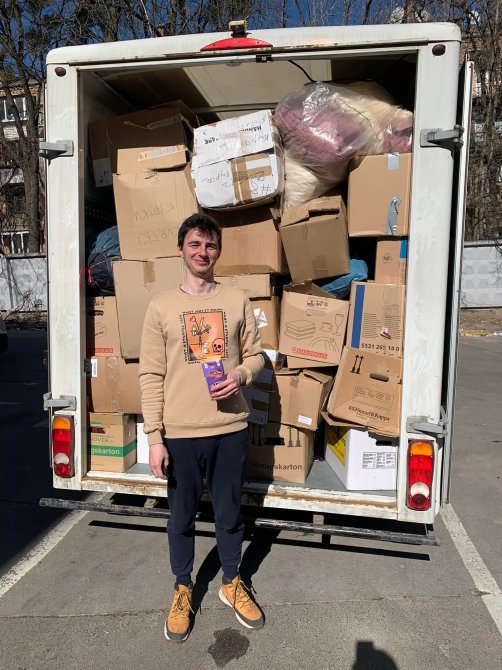Since Russia launched an open military invasion against Ukraine in February, millions of Ukrainians – including Wikimedians – mobilized to defend their country and help people in need, whether by volunteering to help refugees or serving in the army.
Wikimedia Ukraine is supporting Ukrainian Wikimedians during the war – and telling their stories. In this article, we look at two members of our team who’ve devoted themselves to volunteering on the ground – Wikimedia Ukraine’s event manager Oleksandr Kotliar and Wiki Loves Earth organizing team member Anastasia Petrova.
The story about Anastasia was first published in the latest edition of The Signpost. Check that article for two more stories not featured here.
Anastasia Petrova, expert volunteer
Anastasia Petrova joined the Wikimedian community when she applied for Wikimedia Ukraine’s position of project manager for the international Wiki Loves Earth photo contest in early 2020. After two years managing the competition, she recently transitioned to a volunteer role on the project’s organizing team.

Anastasia has a big network of friends and a lot of experience volunteering for various social and ecological causes. So, when Russia started its full-scale war in Ukraine, it was a logical and obvious step for Anastasia to devote herself to volunteer work helping refugees and the army.
In the first week, Anastasia took a leave from work and was volunteering full-time. At the time, she stayed in Lviv, a city in Western Ukraine, and worked in the humanitarian center. They accepted humanitarian help from locals (such as food and clothes), sorted it and sent it to those who needed it – people displaced by the war, hospitals, and armed forces. Anastasia also helped with translations from Ukrainian for foreigners who arrived at the railway station in Lviv.
Anastasia’s main job is managing projects at Beetroot Academy, a non-profit Swedish-Ukrainian IT school. A week into the war, she resumed her work there, focusing on the projects that help people who have suffered from the war to start a new career in tech, particularly women and vulnerable populations.
Still, Anastasia is doing a lot of volunteering as well. She temporarily moved to Berlin, where she is working at the humanitarian center that helps Ukrainians. Sometimes she helps with logistics (such as sorting and shipping items), but her main focus is fundraising. She is raising money for the Ukrainian cause and is working with local Berlin companies to solicit material donations, such as clothes and food packets.
Once the humanitarian center’s work becomes more stable, Anastasia plans to return to Kyiv and put more focus on information work, documenting the war. She says a lot of people across the world don’t know about the situation in Ukraine, especially those who don’t speak English – and she wants to join the effort in communicating with people across the globe.
Event manager’s daily life during the war — Oleksandr Kotliar
Oleksandr Kotliar is Wikimedia Ukraine’s event manager. Not long ago, he spent much of his time organizing our annual Wikiconferences, regular meetups and awards ceremonies, and other gatherings. When the war started, however, he devoted most of his time to volunteering on the ground.

Oleksandr lives in Kyiv, Ukraine’s capital. When Russia openly invaded Ukraine, Kyiv came under attack. (Eventually, the Russian army failed to take Kyiv and retreated from this region, though the city remains at risk from long-distance rocket attacks, and some suburbs suffered tremendously from Russia’s temporary occupation). Yet, Oleksandr decided to remain in Kyiv.
Oleksandr transported his wife and young daughter to a safer location in the west, then returned to Kyiv to focus on helping people in need. The area where help was needed most – driving, namely transporting people and humanitarian help.
At the very beginning of the war, Oleksandr focused on evacuating people from Kyiv – some people needed a ride to the train station, others preferred to relocate to a safer town or village in the Kyiv region. Sometimes, Oleksandr also helped deliver food to the territorial defense forces in the city.
He and his friends had a volunteer chat where they divided responsibilities. Requests for help came through personal contacts – people who knew volunteers, people who knew people who knew volunteers.
Within a few weeks, the need for evacuation decreased – most of the people who wanted to leave Kyiv had already done so at that point. So, Oleksandr switched from his passenger car to his father’s truck and started transporting goods.
A few times, Oleksandr crossed Ukraine to deliver valuable aid from abroad to Kyiv (for example, he once drove a car packed with insulin and other vital medications) – but he spends most of his time transporting items within Kyiv.

Oleksandr helps transport humanitarian aid and food between warehouses, and he also delivers food to distribution points for vulnerable groups, such as the elderly. At one point, his team provided water, food, and hygiene supplies to all subway stations on the right bank of the capital, used by Kyivans as shelters from missile strikes.
Oleksandr now spends most of his time working in a volunteer team formed around a Ukrainian MP from Kyiv, but he also helps with other initiatives. This work often takes full days: from early morning to late evening. But Oleksandr plans to continue this work for the foreseeable future – he believes that volunteering behind the wheel is the way he can be most useful when his country is at war.
- If you’d like to contribute to Oleksandr’s work supporting people in need in Kyiv during the war, contact Anton Protsiuk at anton.protsiuk@wikimedia.org.ua

Can you help us translate this article?
In order for this article to reach as many people as possible we would like your help. Can you translate this article to get the message out?
Start translation